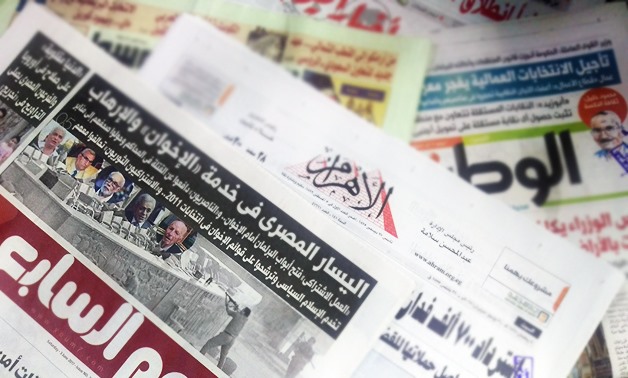
Egyptian daily newspapers – Egypt Today/File photo
CAIRO – 3 June 2017: A collection of significant topics were tackled by Arab writers on Saturday, covering strained Egyptian-Sudanese relations, Egypt’s new NGO law and Qatar’s black history.
Al-Ahram
Poet Farouk Gowaida wrote ‘Some wisdom between Egypt and Sudan.’ He called on the two countries to maintain the bilateral relations. He said the Egyptian-Sudanese relationship should not be spoiled by disputes or statements released recently from the two sides.
Gowaida stressed that the best way to heal the relationship is to gather the two sides and settle all disputing issues so that schemes plotted by some forces will be aborted. He indicated that open dialogue and showing good intentions will definitely be a good initiative from sides of both countries.
He advised the two countries’ media outlets to stop running attacking and criticizing campaigns.
Foreign Minister Sameh Shokry held a joint press conference in Cairo with his Sudanese counterpart, addressing the media outlets in both countries to stop criticism of each side.
Al-Shorouk
Columnist Fahmi Howaidi wrote ‘Fear from Law’, discussing the idea of making laws a deterrent tool by hands of ruling regimes.
He thinks that when laws become a source of fear and threat, they lose their legitimacy because laws will turn into a tool of oppression, not a means to achieve justice. He believes that when laws are accompanied by fears, corruption will exist.
Howaidi criticized the new NGO law. In his opinion, the law will submit all the non-profit and civil society organizations under the supervision of state and security apparatuses.
“We thought that NGOs were the only existing entities, capable of defending political and social freedoms,” Howaidi indicated.
He said that NGO law has become part of the legislative system in Egypt, despite disputes and criticisms of it at the social and political circles.
The law was approved by President Abdel Fatah al-Sisi in May, and was ratified by the House of Representatives last November.
Emad Eddin Hussein, the chief editor of privately owned Al-Shorouk newspaper, addressed the reshuffle of state-owned newspapers reshuffle that took place on Thursday in his essay ‘Press reshuffle & mission kind of impossible.’ Hussein wished luck to the newly appointed chiefs and directors of the state-run media institutions announced on Wednesday.
He stressed the new chiefs will face difficult challenges that are kind of missions impossible for many reasons, including the decrease of the newspapers’ circulation and the increase of the printing costs.
He said “new chiefs need miracles to find new resources” so that they can solve their employees’ financial needs.
He pointed out that Al-Ahram and al-Akhbar are in a better position because they already have their own funds, but other institutions, such as Dar al-Helal, Dar al-Maaref and RosalYusuf, suffer from the economic circumstances.
Hussein indicated the main reason for the bad economic condition of the Egyptian state-run media institutions is corruption and double-standard criteria in appointing unskilled employees.
Youm7
Columnist Akram al-Qasas wrote ‘Wafd & Muslim Brotherhood between history, drama and fairytales.’ He discussed disputes between Wafd Party members and scenarist Wahed Hamed who wrote a scenario of TV drama al-Gam’aa II (the Muslim Brotherhood).
Wafd party sympathizers accused Hamed of fabricating history because his drama series showed Prime Minister Mustafa El-Nahas Pasha kissing the hands of King Farouk. He took up office as PM five times, in 1928, 1930, 1936-1937, 1942-1944 and 1950-1952.
In Hamed’s series al-Gam’aa II, he showed that the relationship between the Wafd Party, King Farouk and El-Nahas was based on enmity.
Hussein said that judging historical stories should rely on narration of facts, not previous biased political stances like soccer fans do when they judge games based upon biased analysis. Human nature is neither evil nor good.
All people make mistakes so it's not a shame to admit mistakes of leaders known for their ideal stances, referring to Nahas Pasha who is seen as an ideal person by Wafd supporters.
He pointed out that political forces believe the history of their leaders must neither be touched nor criticized.
Asharq Awsaat
In an essay titled ‘Egypt will never fall down,’ Emeil Amin discussed the recent terrorist attack on a bus carrying Copts in Minya governorate on the eve of the first day of the holy month of Ramadan, killing at least 29 Copts.
He stressed the Egyptian national fabric stands before any foreign attacks targeting the national unity between Muslims and Copts.
Amin praised statements issued by President Abdel Fatah al-Sisi and Pope Tawadros II, following the terrorist attack. He endorsed the Egyptian airstrikes on Libya that targeted terrorists’ sites in eastern and central Libya.
He believes combating terrorism must take place on two levels. The first is the logistic, security and military level and the second is ideological and intellectual. “Egypt will never fall as long as the Egyptians raise the motto of Muslim and Copt being one hand,” Amin added.
Saudi-owned al-Jazeera
Saudi writer Jaser Addel Aziz al-Jaser wrote ‘Black record of Qatari rulers.’ He referred to the Kuwaiti mediation to settle disputes between Gulf states and Qatar. He did not doubt the good intention of Kuwaiti Prince Sheikh Sabah al-Ahmed, but he doubted the success of that reconciliation mediation.
He indicated the Qatari Prince did not abide by the terms signed in Riyadh during the recent GCC-American summit or the Islamic-American summit. “It has been proven and documented that Qatar has backed and funded terrorist groups,” al-Jaser said.
He believes more facts will be uncovered in the coming days about Qatar and its relationship with funding terrorism in the world and the region, including ISIS, Nusra Front and Houthis.
He stressed terrorist groups backed by Qatar seek to destroy Arab countries, including Egypt, as Qatar embraces the outlawed Muslim Brotherhood and provides it with funds and information to carry out criminal and terrorist acts against the Egyptian regime and society.

Comments
Leave a Comment